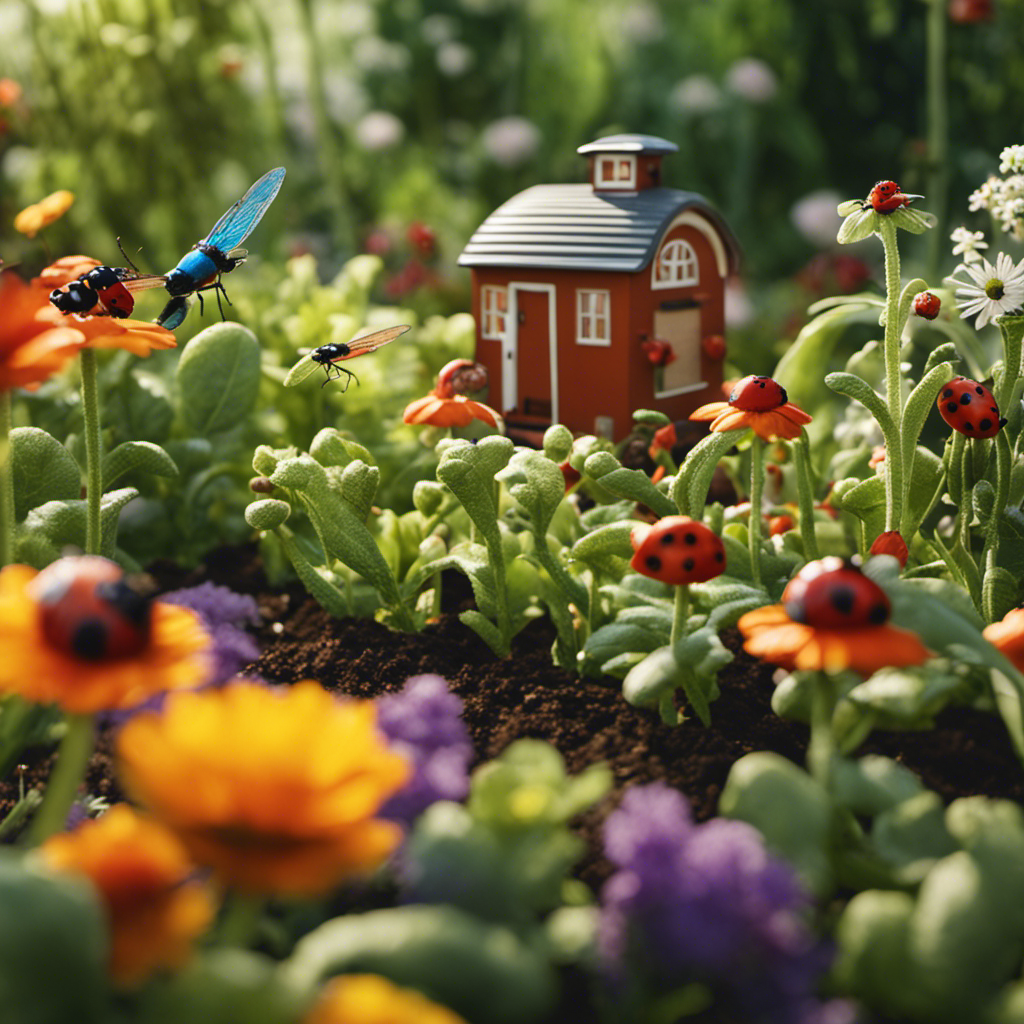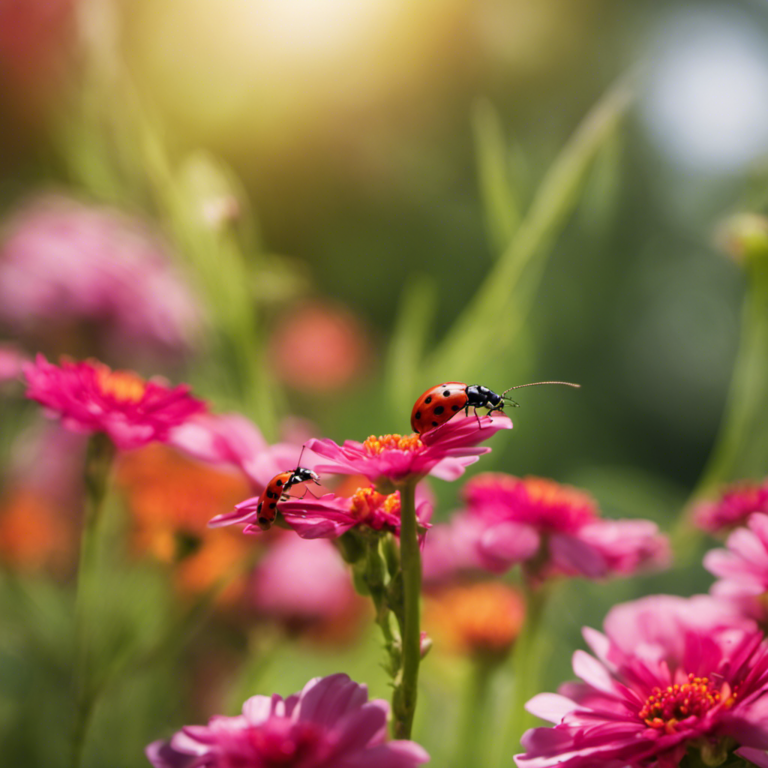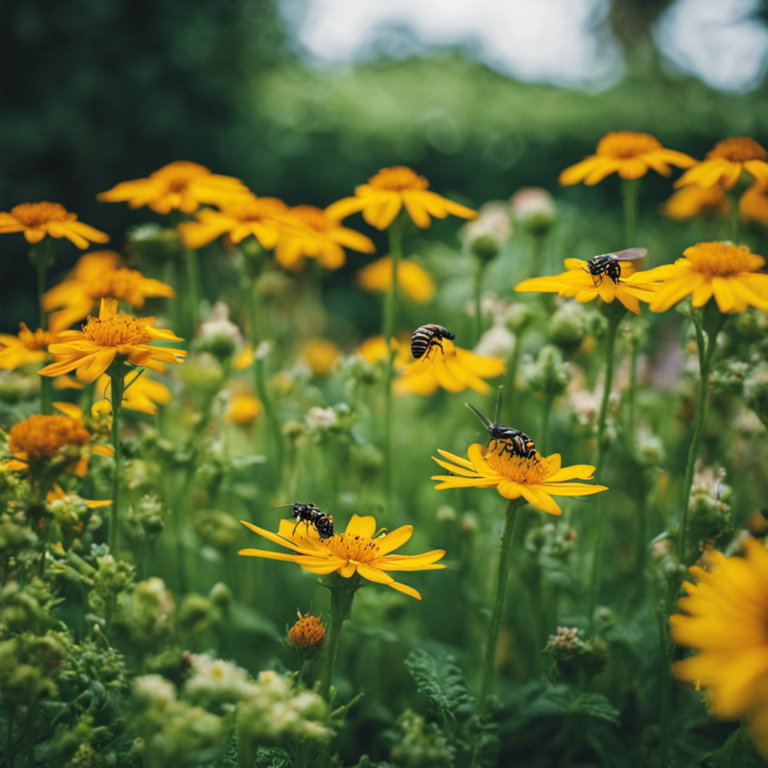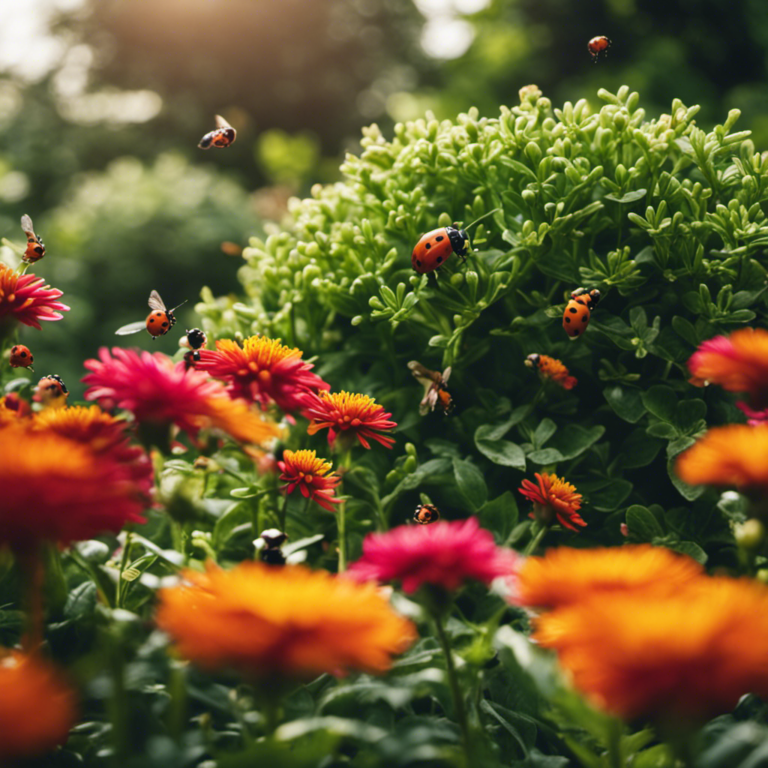Are pests wreaking havoc on your garden? Don’t fret, because you have the power to combat them using organic pest control methods.
By understanding how to naturally protect your plants, you can keep those unwanted critters away.
This article will guide you through the world of organic pest control for your garden.
From using natural repellents to attracting beneficial insects and creating homemade insecticides, you’ll discover practical and effective ways to safeguard your precious plants.
Get ready to enjoy a thriving, pest-free garden with these simple and eco-friendly solutions.
Key Takeaways
Understanding Organic Pest Control for Your Garden
Organic pest control methods offer a practical and effective solution for gardeners. Did you know that using natural repellents and beneficial insects can reduce pest damage by up to 75%? By implementing these strategies, you can protect your garden without harming the environment or compromising your health.
So why not give organic pest control a try and enjoy a thriving garden that’s free from harmful chemicals and pests?
Organic pest control methods provide a safe and sustainable way to protect your garden from pests. By using natural repellents and beneficial insects, you can significantly reduce pest damage by up to 75%. This approach not only keeps your garden healthy but also helps preserve the environment and safeguard your well-being.
Instead of relying on harmful chemicals, organic pest control focuses on natural solutions that work harmoniously with nature. By introducing beneficial insects like ladybugs and lacewings, you can effectively control pest populations without causing harm to the ecosystem. Additionally, using repellents made from natural ingredients such as neem oil and garlic can deter pests without posing a risk to your health.
Organic pest control is not only effective but also easy to implement. By following simple steps like proper plant selection, regular monitoring, and maintaining a balanced ecosystem, you can create a garden that thrives without the need for synthetic pesticides. This approach not only protects your plants but also encourages biodiversity and promotes a healthier and more sustainable environment.
In conclusion, organic pest control offers a practical and eco-friendly solution for gardeners. By embracing natural methods and avoiding harmful chemicals, you can create a thriving garden that is free from pests and safe for both you and the environment. So why not give organic pest control a try? Your garden will thank you.
Natural Repellents for Garden Pests
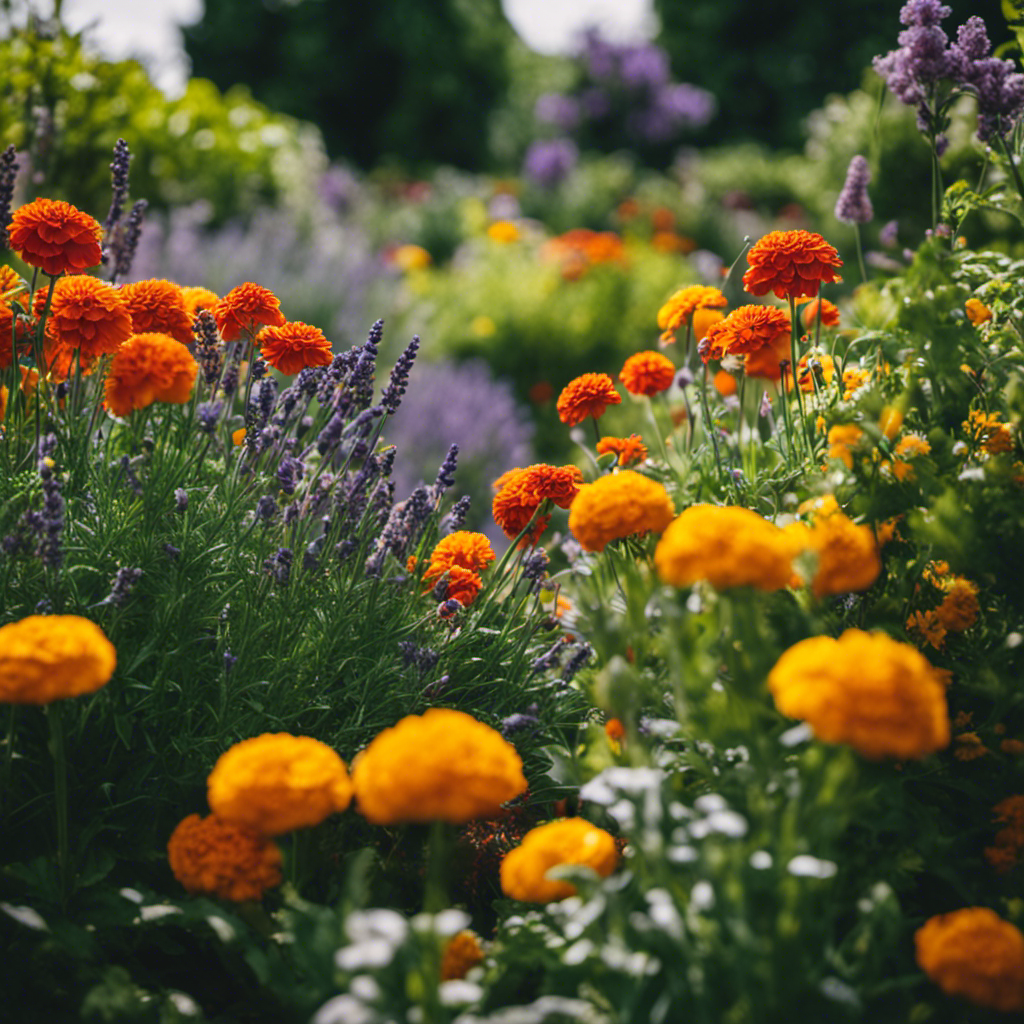
To effectively repel garden pests, you can rely on natural repellents that are safe for both your plants and the environment. Natural pest control methods are a great alternative to chemical-based products that may harm beneficial insects and pollinators. Non-toxic pest management isn’t only effective but also sustainable in the long run.
One popular natural repellent is neem oil, derived from the neem tree. Neem oil acts as a natural insecticide and disrupts the feeding and reproductive patterns of pests. It’s an effective and environmentally-friendly option for pest control in your garden.
Another effective natural repellent is garlic spray, which repels a wide range of insects due to its strong odor. By spraying garlic spray on your plants, you can deter pests without harming your garden or the environment.
In addition to repellents, you can also consider planting companion plants like marigolds. These plants release natural compounds that repel pests, making them excellent companions for your garden vegetables and flowers.
Physical barriers like netting can also be used to protect your plants from pests. By covering your plants with netting, you can prevent pests from reaching them and causing damage.
Beneficial Insects for Pest Control
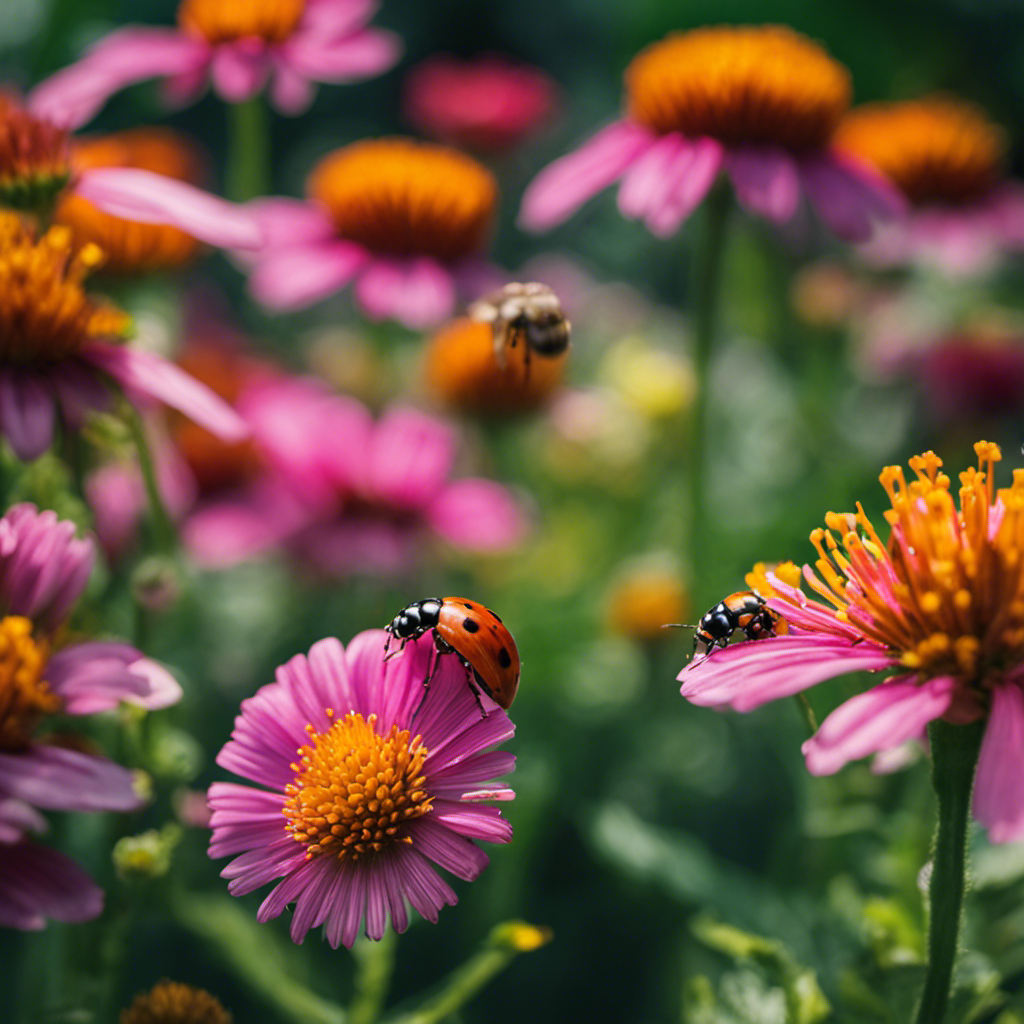
Enhance Your Natural Pest Control Approach with Beneficial Insects
To naturally control pests in your garden, consider attracting and utilizing beneficial insects. These insects play a crucial role in keeping pest populations in check, reducing the need for chemical pesticides. Integrated pest management strategies involve creating an environment that attracts beneficial insects while deterring harmful pests.
One effective method to attract beneficial insects is through companion planting. By planting flowers and herbs that attract pollinators such as bees and butterflies, you can create a habitat that encourages these beneficial insects to visit your garden.
Here is a table showcasing some common beneficial insects and the pests they help control:
| Beneficial Insect | Pest Controlled |
|---|---|
| Ladybugs | Aphids, mites |
| Hoverflies | Aphids, thrips |
| Parasitic Wasps | Caterpillars, aphids |
| Ground Beetles | Slugs, snails |
| Lacewings | Aphids, whiteflies |
Homemade Organic Insecticides

Consider making your own organic insecticides to effectively control pests in your garden. These DIY solutions aren’t only safe for your plants and the environment but also eliminate the need for harmful chemicals.
Here are some practical and effective homemade insecticides that you can try:
-
Oil spray: Create a mixture by combining one tablespoon of vegetable oil with one quart of water and a few drops of dish soap. This solution can be sprayed directly on the pests, suffocating and killing them.
-
Garlic and pepper spray: Blend a bulb of garlic, a teaspoon of cayenne pepper, and one quart of water. After straining the mixture, spray it on your plants to repel insects.
-
Neem oil spray: Mix one tablespoon of neem oil with one quart of water and a few drops of dish soap. This solution can be sprayed on plants to deter a wide range of pests.
Companion Planting for Pest Prevention
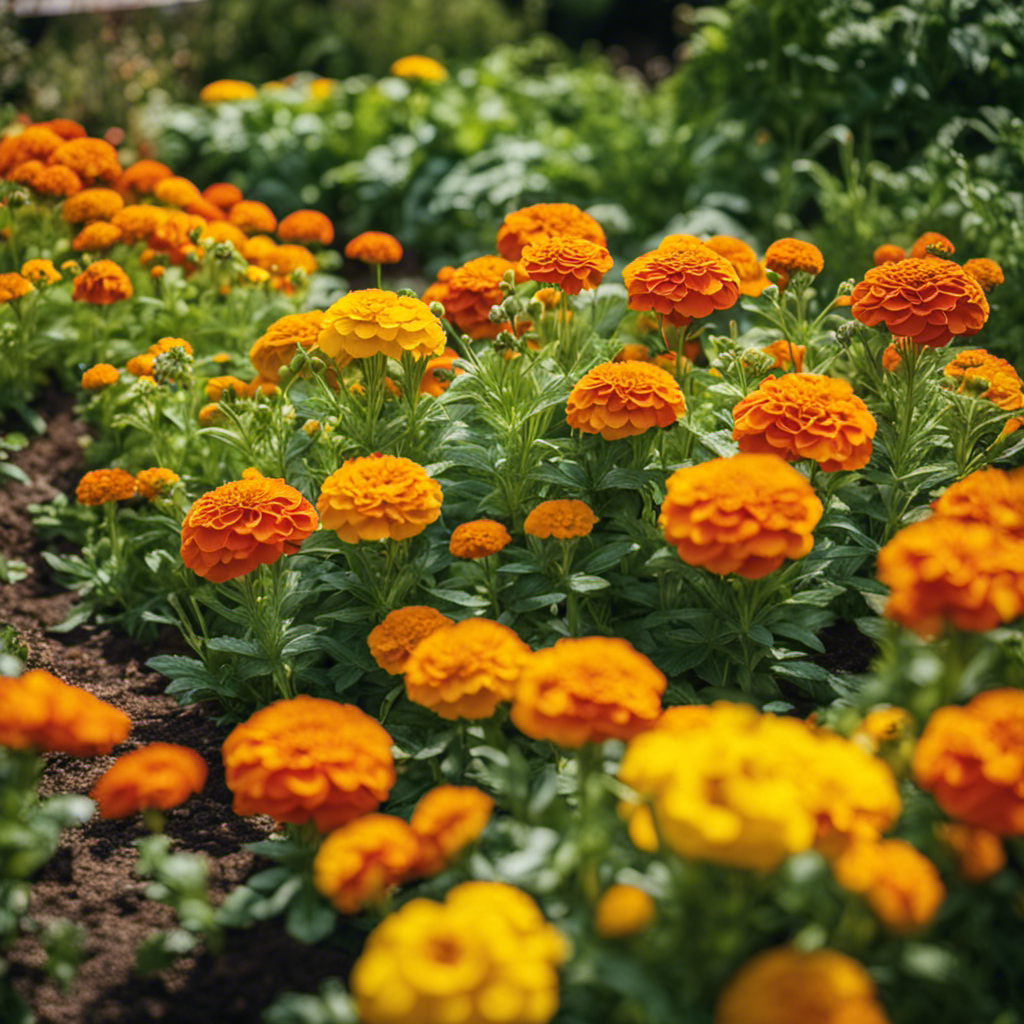
Companion Planting for Natural Pest Control
One effective method for keeping pests at bay in your garden is companion planting. This technique involves strategically planting certain crops together to create a mutually beneficial environment. By doing so, you can naturally deter pests without resorting to harmful chemicals.
One commonly used approach is intercropping, which involves planting different crops in close proximity to one another. This method confuses and deters pests, making it harder for them to locate their preferred host plants. For example, planting onions alongside carrots can help repel carrot flies.
Another technique is trap cropping, where you plant a sacrificial crop that attracts pests away from your main crops. This diversionary tactic helps protect your desired plants from damage. For instance, planting marigolds around your vegetable garden can attract aphids, saving your vegetables from infestation.
Organic Soil Management to Deter Pests

Incorporating organic soil management techniques is an effective way to deter pests in your garden, as part of natural pest control methods. By implementing these practices, you can create a healthy and resilient garden ecosystem that discourages pests from taking hold.
Here are three key strategies for organic soil management to deter pests:
-
Crop rotation: To prevent the buildup of pests that are specific to certain plants, it’s important to rotate your crops each year. By switching the location of your crops, you disrupt the life cycle of pests, making it harder for them to establish and multiply.
-
Biological control: Encouraging beneficial insects, such as ladybugs and lacewings, to thrive in your garden can help keep common garden pests like aphids and caterpillars in check. These natural predators prey on pests, helping to control their populations.
-
Organic amendments: Improving the health of your soil is crucial in deterring pests. Adding organic matter like compost and well-rotted manure enhances soil fertility, promotes beneficial microbial activity, and creates a balanced environment that’s less attractive to pests.
Conclusion
Organic pest control methods offer a practical and effective solution for gardeners. Did you know that using natural repellents and beneficial insects can reduce pest damage by up to 75%?
By implementing these strategies, you can protect your garden without harming the environment or compromising your health.
So why not give organic pest control a try and enjoy a thriving garden that’s free from harmful chemicals and pests?
